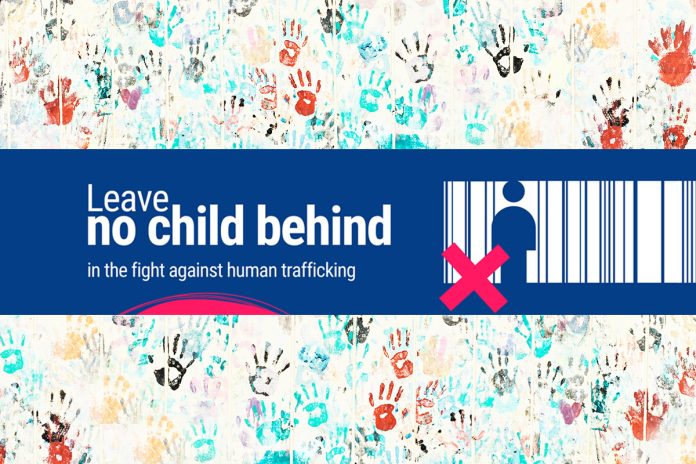Rome (Italy). On 30 July 2024, the World Day against Trafficking in Human Beings will be celebrated, established by the UN General Assembly in 2013 to raise awareness of victims of trafficking and to try to combat this phenomenon.
Although human trafficking is considered a criminal activity and most countries have laws against it, It is essential to continue working towards a legislative framework oriented towards prevention, protection of victims, and prosecution of traffickers.
Leave No Child Behind in the Fight Against Human Trafficking is the theme of Day 2024, which calls for urgent action to end trafficking of children. Children represent a significant percentage of victims of trafficking worldwide and girls are particularly affected. Globally, one in three victims of human trafficking is a child.
In a context of multiple crises: armed conflicts, pandemics, economic and environmental crises, etc., children are the most vulnerable to trafficking. The proliferation of online platforms brings additional risks, as children often connect to websites and social networks without adequate precautions. Traffickers exploit online platforms, social media, and the dark web to recruit and exploit children, using technology to circumvent detection. The aim is to reach a wider audience and disseminate exploitation-related content.
Children are exploited in a variety of ways: for forced labor, crime or drug addiction, as well as trafficking for illegal adoption, recruitment into the armed forces, for online and sexual abuse and exploitation. The root causes are manifold, including poverty, inadequate support for unaccompanied minors in the context of increasing migration and refugee flows, armed conflicts, broken families, and lack of parental care. In particular, in low-income Countries, children are often trafficked for forced labor, while in high-income Countries, among the victims who are minors, sexual exploitation remains prevalent.
As Pope Francis affirms in his Message for the 10th World Day of Prayer and Reflection against Trafficking of People, to combat trafficking, “We must get to the root of the phenomenon, eradicating its causes.” However, it is also essential to oppose what the Holy Father calls the “globalization of indifference”, which takes away society’s compassion, its capacity to cry, to “suffer with others”:
“Trafficking is often invisible. The media, thanks also to courageous reporters, shed light on the slavery of our time, but the culture of indifference anesthetizes us. Let us help each other to react, to open our lives, our hearts to so many sisters and brothers who are treated like slaves. It is never too late to decide to do this.”
Pope Francis continues, “It is a call not to stand still, to mobilize all our resources in the fight against trafficking and to restore full dignity to those who have been victims. If we close our eyes and ears, if we remain passive, we will be accomplices.”
It is a call that strongly challenges the Daughters of Mary Help of Christians, engaged in different ways in the care of children and in the promotion of women, in the protection of human dignity, especially of children and of the most vulnerable and disadvantaged people.
In various parts of the world, the FMA Institute is engaged with dedicated works and with a capillary work in sensitizing, preventing, and protecting victims of trafficking. There are various initiatives, such as raising awareness among and within societies about trafficking and its negative consequences, exhibitions and demonstrations, participation in meetings of international bodies, creation of networks with other organizations and congregations, such as the International Network of Consecrated Life against Trafficking of Persons “Talitha Kum”.
To stop this phenomenon, the current need is to strengthen the network with all people who can put into play concrete skills and energies, and prayer. Networking creates more resilient and sustainable societies, which protect the rights and dignity of all individuals, especially those most at risk for various forms of exploitation.
In the year of the Bicentenary of Don Bosco’s Dream at 9 years, and in the footsteps of Mother Mazzarello, who like him spent her life to respond to the need for meaning and full joy of the young people, the Pope’s words gain even more force to not leave this cry unheard:
“Let us listen to their cry for help; let us be challenged by their stories; and together with the victims and the young people let us return to dream of a world where people can live in freedom and dignity.”




















